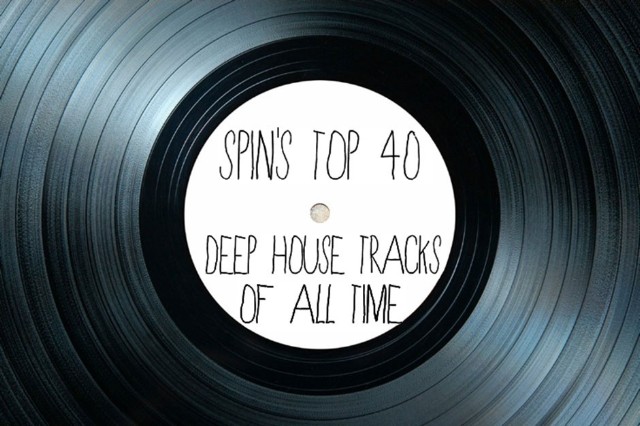Iz & Diz, “Mouth (Brad Peep’s Remix for Friends)” (Classic, 2002)
Matthew Herbert wasn’t the only one making kicking house tracks out of quotidian sounds back around the turn of the millennium. In 2002, Chicago’s Iz & Diz breathed new life into minimalism with “Mouth,” a lurching, jacking track sourced entirely from breaths, clicking tongues, and staccato monosyllables. Pepe Bradock’s remix is just as economical in its means — every sound was made by lips or larynx — but he blows it all sky high, inflating tiny vocal samples into ballooning, organ-like pads, piling on a billowy doo-wop chorus, and even indulging a zany, kazoo-like solo at the song’s dizzy peak. In Bradock’s hands, what could have been a novelty song is turned into one of dance music’s most inventive (and unerring) crowd-pleasers. P.S.
E.S.P., “It’s You” (Underground, 1986)

Also Read
The 30 Best Britney Spears Songs
Long before deep house was a thing — hell, even before house itself was a thing, at least outside Chicago’s WBMX and a handful of local nightclubs —Tom Adams and Daniel Ellington laid down the sound’s foundations with “It’s You,” a heavenly slice of machine-assisted soul. The song’s verse-chorus structure is a holdover from traditional song form, but everything else about it sounds alien and spine-tinglingly new, from its stubby little bass line and brittle drum sounds to its plucked arpeggios and milky pads. It’s sneaky, too, laying down a dusky, deceptively minor-key introduction as the setup to the big reveal — those sunny, major triads of the chorus, which sound a little like the Cars’ “Drive” distilled into an IV drip for the treatment of broken-hearted robots. P.S.
Romanthony, “The Wanderer” (Black Male, 1993)
When New Jersey’s Romanthony died of kidney disease this May, most publications identified him first as the singer of Daft Punk’s “One More Time” (including, yeah, SPIN). That made sense: “One More Time” is one of the most famous and beloved songs in the dance-music canon; earlier this year, Mixmag readers even voted it the “Greatest Dance Track of All Time”. But Romanthony’s own music was far stranger and more affecting than that Auto-Tuned hook ever suggested — an unlikely collision of blues guitar, live-wire machine funk, and his own absolutely heavenly voice, which inspired frequent (and justified) comparisons to Prince.”The Wanderer” was first released on Romanthony’s own Black Male Records in 1993, reissued the following year on Chicago’s Prescription, and remixed many, many times since then; in late 2009, an edit by Berlin’s Dixon gave it a gentle overhaul in keeping with contemporary, Continental deep-house tastes. (This year, even Steve Aoki’s Dim Mak got into the action, picking up “The Wanderer” and fleshing it out with a handful of electro-house remixes. The results are forgettable, but their very existence is proof of the guy’s universal appeal.) “It’s the system that makes you a wanderer,” Romanthony mutters over chiming acoustic guitars and a proto-2-step skip, answering himself with a soaring chorus that sounds like heartbreak incarnate. The “Fusion Dubb” took the song to a much darker place, framing multi-tracked harmonies against a bare-bones jack track and ominous, rumbling bass, while the “Temple Vox Mix” stripped away the drums and left Romanthony floating wraithlike over gauzy synths and insect chirps — a soul without a body, a voice unbounded. P.S
MK feat. Alana, “Love Changes (Deep Mix)” (Charisma, 1993)
If Marc Kinchen had patented the jabbing organ bass of his early productions, he’d be a wealthy man by now; the MK bass line has gone on to become a staple dance-music trope, like the Reese bass or the Mentasm stab, and it has flourished in recent years, as acolytes like Maya Jane Coles have brought it back for a new generation of house heads. (It’s a canonical enough sound that you’ll even find production tutorialsdedicated to its recreation.) But Kinchen’s doing just fine on his own. After taking a production break that lasted from 1996 until 2009 or so, he has once again become the industry’s point person for sultry, subterranean club reworks, just as he was in the early 1990s; in the past two years, he’s remixed Lana Del Rey, Rhye, Sky Ferreira, Disclosure, Katy B, FCL, Sub Focus, Thirty Second to Mars, and Storm Queen, whose “Look Right Through” went to No. 1 in the U.K. charts on the back of MK’s remix.But his early catalog offers a similar bounty of deep, moody delights, like the sensual “Burning,” featuring Alana, or the abstract, nearly ambient “MKappella,” with its bird calls and crashing waves and vibey, vibey flute solo. “Love Changes (Deep Mix)” may not have attained the status of “Burning,” and who knows, on some scales, “Burning” might even be the deeper of the two. But let’s go with the non-canonical pick, if only because you won’t find pianos like this anywhere else, and Alana’s pro-love, pro-commitment, in-it-for-the-long-haul lyrics (“I wanna be right there for you / I wanna be by your side / I wanna be right there for you / ‘Cause love changed my mind”) come across as the most earnest dance-floor epiphany possible. Somewhere, there’s a 20-year-old walking around who owes her entire existence to this song, and you can bet that her parents are still together. P.S.
Earth People, “Dance” (Kool Groove Records, 1989)
This is another one that maybe doesn’t slot comfortably into deep house as it’s narrowly defined, but who gives a damn, because house tracks don’t come much deeper than this 1989 classic from New York’s Pal Joey in his Earth People guise. You can hear the origins of Daft Punk’s filter-disco edits here; just as importantly, you can hear the hip-hop roots in this pause-button style of cut-and-pasted funk. It’s not that far off from what De La Soul or the Jungle Brothers were doing around the same time, but liberated from hip-hop’s narrative dictates, Pal Joey is free to loop with hypnotic abandon, piling up snippet after snippet of sax and drums and voice and bass, drawing it out as far as it’ll go until it stretches like a smile drawn in chunky crayon from club wall to club wall. The fact that he called this EP — his first — Underground Classic is so prescient, it boggles the mind. P.S.




